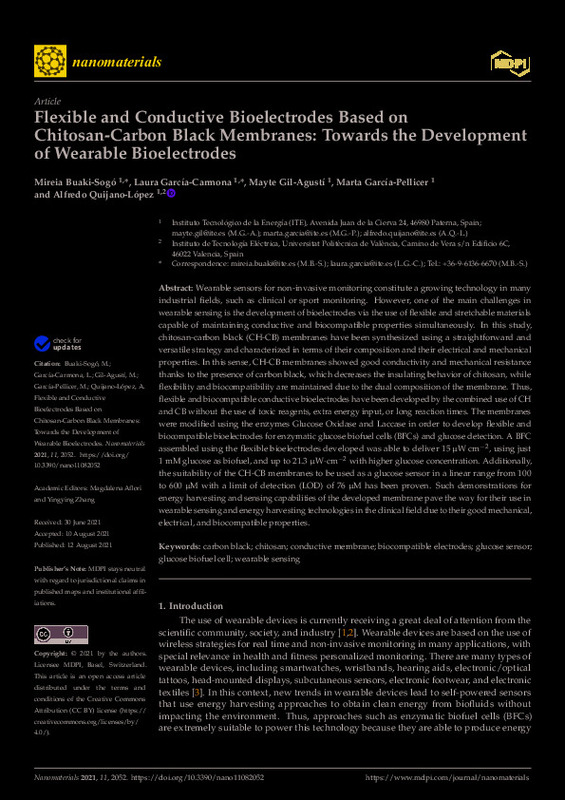JavaScript is disabled for your browser. Some features of this site may not work without it.
Buscar en RiuNet
Listar
Mi cuenta
Estadísticas
Ayuda RiuNet
Admin. UPV
Flexible and Conductive Bioelectrodes Based on Chitosan-Carbon Black Membranes: Towards the Development of Wearable Bioelectrodes
Mostrar el registro sencillo del ítem
Ficheros en el ítem
| dc.contributor.author | Buaki-Sogo, Mireia
|
es_ES |
| dc.contributor.author | García-Carmona, Laura
|
es_ES |
| dc.contributor.author | Gil Agustí, María Teresa
|
es_ES |
| dc.contributor.author | GARCÍA PELLICER, MARTA
|
es_ES |
| dc.contributor.author | Quijano-Lopez, Alfredo
|
es_ES |
| dc.date.accessioned | 2022-07-29T18:02:08Z | |
| dc.date.available | 2022-07-29T18:02:08Z | |
| dc.date.issued | 2021-08 | es_ES |
| dc.identifier.uri | http://hdl.handle.net/10251/184971 | |
| dc.description.abstract | [EN] Wearable sensors for non-invasive monitoring constitute a growing technology in many industrial fields, such as clinical or sport monitoring. However, one of the main challenges in wearable sensing is the development of bioelectrodes via the use of flexible and stretchable materials capable of maintaining conductive and biocompatible properties simultaneously. In this study, chitosan-carbon black (CH-CB) membranes have been synthesized using a straightforward and versatile strategy and characterized in terms of their composition and their electrical and mechanical properties. In this sense, CH-CB membranes showed good conductivity and mechanical resistance thanks to the presence of carbon black, which decreases the insulating behavior of chitosan, while flexibility and biocompatibility are maintained due to the dual composition of the membrane. Thus, flexible and biocompatible conductive bioelectrodes have been developed by the combined use of CH and CB without the use of toxic reagents, extra energy input, or long reaction times. The membranes were modified using the enzymes Glucose Oxidase and Laccase in order to develop flexible and biocompatible bioelectrodes for enzymatic glucose biofuel cells (BFCs) and glucose detection. A BFC assembled using the flexible bioelectrodes developed was able to deliver 15 mu W cm(-2), using just 1 mM glucose as biofuel, and up to 21.3 mu W center dot cm(-2) with higher glucose concentration. Additionally, the suitability of the CH-CB membranes to be used as a glucose sensor in a linear range from 100 to 600 mu M with a limit of detection (LOD) of 76 mu M has been proven. Such demonstrations for energy harvesting and sensing capabilities of the developed membrane pave the way for their use in wearable sensing and energy harvesting technologies in the clinical field due to their good mechanical, electrical, and biocompatible properties. | es_ES |
| dc.description.sponsorship | This work has been supported by the Instituto Valenciano de Competitividad Empresarial (IVACE) in accordance with the IMAMCL/2020/1 agreement and within the framework of the BioSensCell project. | es_ES |
| dc.language | Inglés | es_ES |
| dc.publisher | MDPI AG | es_ES |
| dc.relation.ispartof | Nanomaterials | es_ES |
| dc.rights | Reconocimiento (by) | es_ES |
| dc.subject | Carbon black | es_ES |
| dc.subject | Chitosan | es_ES |
| dc.subject | Conductive membrane | es_ES |
| dc.subject | Biocompatible electrodes | es_ES |
| dc.subject | Glucose sensor | es_ES |
| dc.subject | Glucose biofuel cell | es_ES |
| dc.subject | Wearable sensing | es_ES |
| dc.subject.classification | INGENIERIA ELECTRICA | es_ES |
| dc.title | Flexible and Conductive Bioelectrodes Based on Chitosan-Carbon Black Membranes: Towards the Development of Wearable Bioelectrodes | es_ES |
| dc.type | Artículo | es_ES |
| dc.identifier.doi | 10.3390/nano11082052 | es_ES |
| dc.relation.projectID | info:eu-repo/grantAgreement/Institut Valencià de Competitivitat Empresarial//IMAMCL%2F2019%2F1//BioSensCell. Bioelectrodos enzimáticos para pilas de combustible biológico y sistemas sensores/ | es_ES |
| dc.relation.projectID | info:eu-repo/grantAgreement/Institut Valencià de Competitivitat Empresarial//IMAMCL%2F2020%2F1//BioSensCell. Bioelectrodos enzimáticos para pilas de combustible biológico y sistemas sensores/ | es_ES |
| dc.relation.projectID | info:eu-repo/grantAgreement/Institut Valencià de Competitivitat Empresarial//IMAMCL%2F2021%2F1//BioSensCell. Bioelectrodos enzimáticos para pilas de combustible biológico y sistemas sensores/ | es_ES |
| dc.rights.accessRights | Abierto | es_ES |
| dc.contributor.affiliation | Universitat Politècnica de València. Instituto de Tecnología Eléctrica - Institut de Tecnologia Elèctrica | es_ES |
| dc.contributor.affiliation | Universitat Politècnica de València. Departamento de Ingeniería Eléctrica - Departament d'Enginyeria Elèctrica | es_ES |
| dc.description.bibliographicCitation | Buaki-Sogo, M.; García-Carmona, L.; Gil Agustí, MT.; García Pellicer, M.; Quijano-Lopez, A. (2021). Flexible and Conductive Bioelectrodes Based on Chitosan-Carbon Black Membranes: Towards the Development of Wearable Bioelectrodes. Nanomaterials. 11(8):1-17. https://doi.org/10.3390/nano11082052 | es_ES |
| dc.description.accrualMethod | S | es_ES |
| dc.relation.publisherversion | https://doi.org/10.3390/nano11082052 | es_ES |
| dc.description.upvformatpinicio | 1 | es_ES |
| dc.description.upvformatpfin | 17 | es_ES |
| dc.type.version | info:eu-repo/semantics/publishedVersion | es_ES |
| dc.description.volume | 11 | es_ES |
| dc.description.issue | 8 | es_ES |
| dc.identifier.eissn | 2079-4991 | es_ES |
| dc.identifier.pmid | 34443882 | es_ES |
| dc.identifier.pmcid | PMC8398670 | es_ES |
| dc.relation.pasarela | S\456164 | es_ES |
| dc.contributor.funder | Institut Valencià de Competitivitat Empresarial | es_ES |








